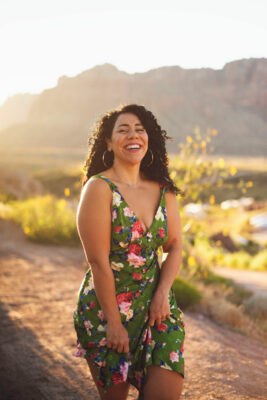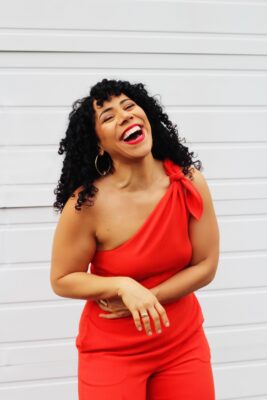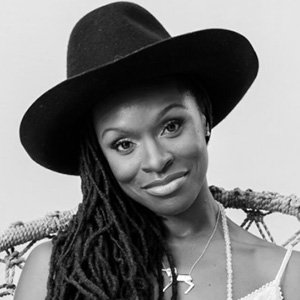‘Dream Job’ Not Feeling so Dreamy? Here’s How One Woman Made a Change
For years, mezzo-soprano singer Shirin Eskandani used her vocal gift to move opera audiences. But when she landed a role in her dream performance—a goal she'd been working toward for years—she still felt inadequate. This experience was the catalyst behind a career shift, and now, as the life coach behind Wholehearted Coaching, she's using her voice in a different way: to help people tap into their intuition and find their purpose and joy. Here, ahead of this month's Inner Compass: The Course workshop, she speaks with Well+Good Council member Latham Thomas about letting go of the "perfect" life she'd hustled for—and finding a more fulfilling path forward.
Latham Thomas: Can you share a bit about the work that you do?
Shirin Eskandani: I help women realign the compass that I think we all have: the compass that leads us in the most true direction for ourselves. The work is about developing more self trust, self-compassion, and self-love.
"I had an incredible career, but I was on the verge of burnout." —Shirin Eskandani
What inspired you to move in this direction?
I grew up in Canada, where I'd been a big fish in a little pond. When I moved to New York, all of that inner work that I'd never done caught up with me. The insecurity that I had—my perfectionism, my competitive side—became magnified. I was constantly trying to find fulfillment through my work. I had an incredible career, but I was on the verge of burnout.

{{post.sponsorText}}
In 2016, my agent called me and said, "Shirin, the Metropolitan Opera wants you to sing in Carmen next year." My dream opera, my dream opera house! As a young girl, I had always imagined this moment would make me feel joyful, happy, and fulfilled. But I didn't feel any of those things. I thought, "I'm not good enough, and this job is not enough to prove to me that I am good." That's when I had an epiphany: No external achievement or goal would make me feel the way I wanted to feel.
I said yes to the job, of course, and I had a year and a half to prepare for it. In that time, I was preparing my voice, but I was also preparing my mind, spirit, and emotional self. I found mindfulness and started working with a life coach, and that shifted my perspective. To this day, I say that my biggest accomplishment in life wasn't singing at the Met. It was singing at the Met and actually enjoying every moment of that, even when I failed. I had developed so much resilience, empathy, compassion, and love for myself that I was able to be in that present moment. That's how I came to this work.

Is that how you knew you wanted to do this work with other people?
Yes. Singing and coaching for me are kind of the same. They're different vehicles for the same purpose, which is to transform people through joy. You're going on this deep journey with them, and doing it in a joyful way, but shifting their perspective on life.
What does it look like when you support others through your coaching practice?
We always start with self-trust. A common factor in a lot of the women that I have the privilege of working with is that they're doing incredible things in life. They're often the support system for the people in their lives. Yet they don't really trust themselves; they feel like they've made so many mistakes in the past that they can't really trust their inner GPS. For me, it's about bringing everything back to trusting your intuition again and leading your life from there. I think the basis of all growth is trust in oneself.
What practices help you take care of yourself, especially when you're looking after other people?
I try to do at least an hour of my morning ritual, which includes a meditation, journaling, some sort of movement, and reading. That centers me early in the morning. But also, joy is a big part of what I do. I try to find the joy in the little moments, because it's so easy for us to put joy on the back burner. For me, it's grounding to look for ways to pursue joy.
"If we're not addressing the whole self, then we're not really doing true, 360-degree self-care." —Shirin Eskandani
What are the words that you live by?
"Let's just see what happens." That combats my worry and puts me in a playful and curious place. I don't know what the universe has in store for me, so let's see what happens.

Are there ancestral practices that may be important to your work?
In the mornings, I call upon my ancestors. I have pictures of my grandparents around me at all times, and they're a part of me as I do this work. A big part of Iranian culture is connection. We love to listen to people; we're storytellers. And stories are such a great way of learning, right? They're not over your head, and it's not like someone's saying this doctrine to you. It's like you're uncovering something yourself.
What would you say about being a woman of color in the wellness field? How do you navigate that?
When I first started getting curious about wellness, it struck me that the spaces were very white—from the audience to the people on the panels. That was difficult to navigate. I was so excited by the information that was being shared that I thought, "All right, I'm going to sit in this discomfort because I really want this knowledge." One thing that served me from the start was realizing that I wanted to create spaces where women of color could come to heal, feel comfortable, and see themselves reflected there. I want diversity and inclusion to really mean something. When I have blind spots, as we all do, that means working to correct that by engaging with community to see how I can fix that. A big mission of mine is to create a space of healing for women of color. It is our work—for us, by us.
"Taking care of yourself means not just taking care of the parts of you that you love, but also the parts that you have been hiding for years." —Shirin Eskandani
What does that look like for you?
I think one of my superpowers is creating community. I pull upon that because I know how important that is. The power of coming in community and seeing each other is so incredibly healing. When I create a circle, I know I don't even have to do anything because 70% of that work is done with those women being there in that circle.
What do you think folks are missing when we think about wellness or self-care, especially considering the performative aspects of self-care for social media?
Taking care of yourself means not just taking care of the parts of you that you love, but also the parts that you have been hiding for years. All of those parts make up your whole. For me, it's about going into those dark places. Of course, celebrating and enjoying is great, but self-care is messy and uncomfortable at times. So if we're not addressing the whole self, then we're not really doing true, 360-degree self-care.
 Latham Thomas is a master manifestor and the founder of Mama Glow, a healthy gal's guide to actualization in the modern world. Her second book, Own Your Glow, was recently published by Hay House Inc.
Latham Thomas is a master manifestor and the founder of Mama Glow, a healthy gal's guide to actualization in the modern world. Her second book, Own Your Glow, was recently published by Hay House Inc.
What—or whom—should Latham write about next? Send your questions and suggestions to experts@www.wellandgood.com.
Loading More Posts...